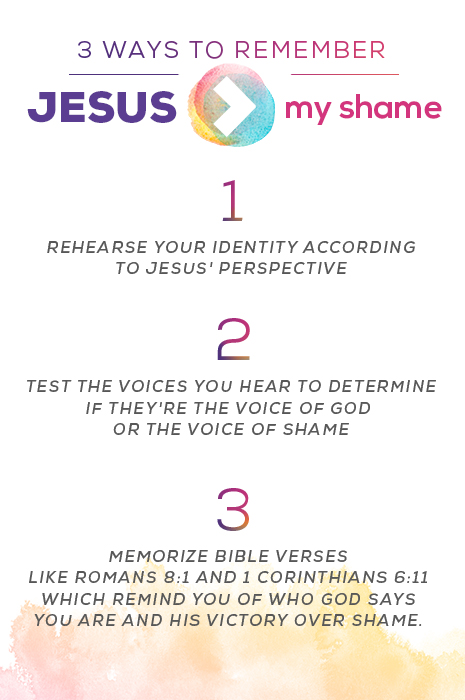
We’ve all felt the power of shame.
For me, feeling like I am failing my wife or my kids triggers shame. When I worked in a toxic church, not meeting a supervisor’s expectations or being rejected by an influential member sent me down a shame spiral.
Sometimes, our past actions which were wrong trigger shame. Other times, our unhealthy souls interpret rejection or disapproval from those we admire as shame.

Discerning the Difference
Several years ago, my pastor shared a little chart with me titled Discerning God’s Voice. The chart had two columns. One column included a list titled My Shame.
According to the card, our shame…
rushes us
pushes us
frightens us
confuses us
discourages us
worries us
obsesses us
condemns us
The shame we feel over our past twists the guilt we should feel for doing something wrong and turns it into paralyzing shame which convinces us God no longer loves us because we are unworthy.
The problem with most temptations is the kernel of truth in them tricks us into swallowing a whole lot of falsehood too. We need to face our wrong behavior, but we don’t need to be buried in shame over it.
In Ephesians 2, the Apostle Paul describes our true condition in our sin. “You used to live in sin, just like the rest of the world, obeying the devil…All of us used to live that way, following the passionate desires and inclinations of our sinful nature. By our very nature we were subject to God’s anger, just like everyone else.”
Things don’t look good for us before Jesus. As my mentor says, “The Gospel is bad news before it’s good news.”
However, Paul immediately introduces the good news beginning with two beautiful words - “But God.”
“But God is so rich in mercy, and he loved us so much, that even though we were dead because of our sins, he gave us life when he raised Christ from the dead. (It’s only by God’s grace that you have been saved.)”
Ephesians 2 teaches us that what Jesus did is greater than what we’ve done in the past and the shame we feel for it. That shame is normal - even Paul felt it. He famously wrote in Romans 7, “I have discovered this principle of life - that when I want to do what is right, I inevitably do what is wrong…Oh, what a miserable person I am.”
The Hope For Our Past and Our Shame
Just a few sentences later though, Paul offers the most hopeful verse in scripture for all who struggle with shame. Romans 8 begins with these words, “So now there is no condemnation for those who belong to Christ Jesus.”

If you have put your faith and trust in Jesus, receiving His forgiveness and grace, you’re no longer under condemnation for your sins and the power of your shame has met its match in Jesus.
If you are “in Christ” as Paul describes, there is one simple test to discern the difference between God’s voice and shame’s voice.
Is the voice convicting you or condemning you?
God convicts us of our sin, while shame condemns us for our sin. Conviction is intended to lead us to repentance and reconciliation with God, but condemnation is intended to lead us to despair and distance from God.
Shame wants to convince you that you’re still who you were in the past. But God no longer sees who you used to be; He now sees who you are in Christ. Because Jesus is greater than your sin and your shame, you are no longer defined by anything other than who Jesus says you are.
Paul wrote some powerful words in 1 Corinthians 6 (after listing several notorious and seemingly heinous sins). “Some of you were once like that. But you were cleansed; you were made holy; you were made right with God by calling on the name of the Lord Jesus Christ and by the Spirit of our God.”
Tuning in to God’s Voice Instead
Jesus is greater than your shame and his voice sounds very different.
While the voice of shame is destructive and disorienting, God’s voice heals and reorients us. The other half of the Discerning God’s Voice card describes what that voice sounds like.
God’s voice…
stills us
leads us
reassures us
enlightens us
encourages us
comforts us
calms us
convicts us
Speaking from personal experience, changing our relationship with shame is not easy and it’s often not quick. But there are simple steps we can repeatedly take which keep the change process moving forward.
- Rehearse your identity according to Jesus’ perspective.
Tuning into who God says we are is one of the best ways to tune out who shame says we are. For help on writing a summary of your identity from Jesus’ perspective, click here.
- Test the voices you hear to determine if they’re the voice of God or the voice of shame.
When we hear a voice in our hearts, we need to examine and test that voice based upon what we know God’s voice sounds like. This card below offers a simple framework to discern God’s voice from the voice of our shame.

3. Memorize Bible verses like Romans 8:1 and 1 Corinthians 6:11 which remind you of who God says you are and His victory over shame.
In Psalm 119, David famously talked about hiding God’s word in his heart. Opportunities to believe and accept shame are coming for all of us. We can get ready in advance by burying God’s truth in our hearts.
As we get ready to celebrate Good Friday and the sacrifice Jesus made for us, remember that who Jesus is, and what Jesus did, is greater than what you’ve done and how you feel about it.
Jesus > your shame
Scott Savage is a pastor and a writer who believes he has the best last name ever. He leads Cornerstone Church in Prescott, Arizona. Scott is married to Dani and they are the parents of three “little savages.” He is the creator of the Free to Forgive course and you can read more of his writing at scottsavagelive.com.





